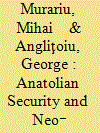|
|
|
Sort Order |
|
|
|
Items / Page
|
|
|
|
|
|
|
| Srl | Item |
| 1 |
ID:
174665


|
|
|
|
|
| Summary/Abstract |
On the morning of August 24, 2016, units of the Turkish armed forces, along with allied groups such as the Free Syrian Army, crossed the border into northern Syria. Their target was a region still dominated by the presence of the weakened and declining Islamic State, yet their ultimate purpose was to block the increase of Kurdish power in the region. Just over a month after an armed coup attempt and exactly five centuries after the battle of Marj Dabiq, which once brought about Ottoman hegemony over Syria and Egypt, the military operation was to represent the beginning of Turkey's direct involvement southward and, arguably, a stepping stone toward dominance in northern Syria. Turkey's increased presence in Syria and its attempt to expand its reach throughout the Middle East and the wider Muslim world can be considered a forward defense of its Anatolian heartland. After all, it is the geography of Anatolia that enables Turkey to project its power into the Marmara straits, the Black Sea, the Aegean Sea and the Eastern Mediterranean, while simultaneously placing the state in proximity to the Caucasus and even within striking distance of the Persian Gulf. Accordingly, Anatolia is also vulnerable to attack from many sides, despite complex relations with historical enemies such as Russia and Greece, leading to the existence of elements of the security community.
|
|
|
|
|
|
|
|
|
|
|
|
|
|
|
|
| 2 |
ID:
183014


|
|
|
|
|
| Summary/Abstract |
This paper uses the concept of totalism to analyze the main features of Islamic State and thus the implications of containing and confronting it and its potential future offshoots. The first part of the paper deals with the origins and concept of totalism, depicting its main features and types. This part begins by briefly showing the main features of totalism, why it must be ultimately differentiated from totalitarianism. The second part of the paper explores the extent to which Islamic State conforms to the model of a renovative totalist movement and why terms such as political religion are unsuited for explaining Islamist and Salafi-Jihadist movements, including Islamic State. Due to the overall direction of its ultimate ideological aims and the way in which it pursues the total reconstruction of public and private life, Islamic State is then found to contain the main features of a militant, renovative totalist movement. Lastly, the paper argues that it is primarily this totalist nature of the movement which, together with total commitment to emulating what it sees as the essential early Islamic traditions and examples, contributes to its long-term resilience even in the face of overwhelming odds and military reversals.
|
|
|
|
|
|
|
|
|
|
|
|
|
|
|
|
|
|
|
|
|